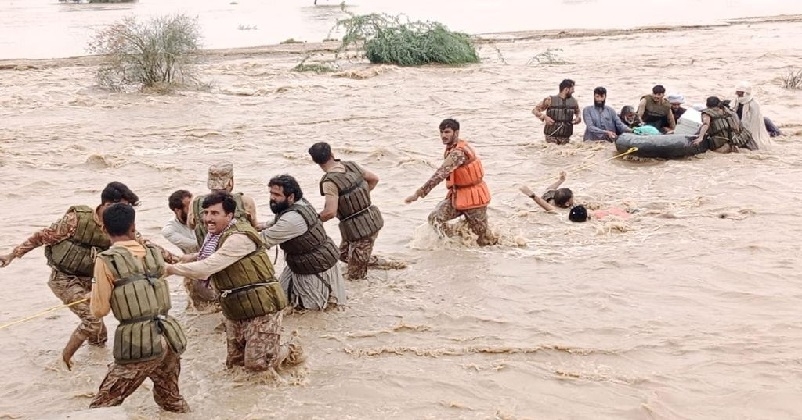Monsoon rains wreak havoc in Pakistan, 1060 dead, nearly 10 lakh homes destroyed, Pakistan seeks help to rebuild
| 29-Aug-2022 |

More than 1061 people have reportedly lost their lives in the historic floods in Pakistan as per figures released by country's National Disaster Management Authority. The floods, which have been driven by unusually heavy monsoon rains since mid June has affected more than 33 million people -- one in seven Pakistanis -- destroying or badly damaging nearly a million homes.
Large parts of the country remain submerged – particularly the provinces of Balochistan, Khyber Pakhtunkhwa and Sindh in the south – as heavy rains continue to lash parts of the country. At least 347 people have died in Sindh followed by Balochistan (238) and KP (226).
The annual monsoon is essential for irrigating crops and replenishing lakes and dams across the Indian subcontinent, but each year it also brings a wave of destruction. This year, precipitation in some regions was 600 percent higher than average.
The NDMA said more than two million acres of cultivated crops have been wiped out, 3,451 kilometres (2,150 miles) of roads destroyed, and 149 bridges washed away.
Floods and rains have caused devastation in Pakistan at a time when the country is facing one of the worst economic crises. Pakistan says it recently narrowly avoided a default, and later Monday IMF's executive board was expected to approve the release of the much-awaited $1.7 billion for this Islamic nation.Pakistan and the IMF originally signed the bailout accord in 2019. But the release of a $1.7 billion tranche has been on hold since earlier this year, when the IMF expressed concern about Pakistan’s compliance with the deal’s terms under former Prime Minister Imran Khan's government.
Sherry Rehman, a Pakistani senator and the country’s top climate official, said in a video posted on Twitter that Pakistan is experiencing a “serious climate catastrophe, one of the hardest in the decade.
The government declared the devastating floods a “national emergency” and is seeking aid from friendly countries. Prime Minister Shehbaz Sharif has appealed for funds from friendly countries and international institutions.
Prime Minister Shehbaz Sharif said, “The magnitude of the calamity is bigger than estimated.” He wrote on Twitter that while a full picture of the destruction was still being compiled, the continuing rain had “caused devastation across the country” with loses comparable to catastrophic flooding in 2010. That disaster affected 18 million people and killed 1,985. Gen. Qamar Javed Bajwa, the country's military chief, said Sunday that his country may take years to recover. He appealed to Pakistanis living abroad to generously donate to the flood victims.